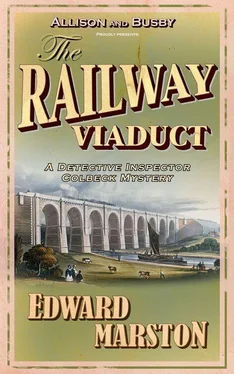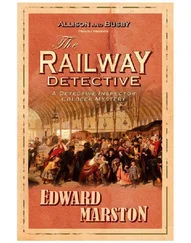Edward Marston - The railway viaduct
Здесь есть возможность читать онлайн «Edward Marston - The railway viaduct» весь текст электронной книги совершенно бесплатно (целиком полную версию без сокращений). В некоторых случаях можно слушать аудио, скачать через торрент в формате fb2 и присутствует краткое содержание. Жанр: Классический детектив, на английском языке. Описание произведения, (предисловие) а так же отзывы посетителей доступны на портале библиотеки ЛибКат.
- Название:The railway viaduct
- Автор:
- Жанр:
- Год:неизвестен
- ISBN:нет данных
- Рейтинг книги:3 / 5. Голосов: 1
-
Избранное:Добавить в избранное
- Отзывы:
-
Ваша оценка:
- 60
- 1
- 2
- 3
- 4
- 5
The railway viaduct: краткое содержание, описание и аннотация
Предлагаем к чтению аннотацию, описание, краткое содержание или предисловие (зависит от того, что написал сам автор книги «The railway viaduct»). Если вы не нашли необходимую информацию о книге — напишите в комментариях, мы постараемся отыскать её.
The railway viaduct — читать онлайн бесплатно полную книгу (весь текст) целиком
Ниже представлен текст книги, разбитый по страницам. Система сохранения места последней прочитанной страницы, позволяет с удобством читать онлайн бесплатно книгу «The railway viaduct», без необходимости каждый раз заново искать на чём Вы остановились. Поставьте закладку, и сможете в любой момент перейти на страницу, на которой закончили чтение.
Интервал:
Закладка:
'And were there any other incidents?'
'The first was a case of simple theft – at least that's what we thought at the time. But who would want to steal gunpowder?'
'Someone who needed to blast through rock.'
'The second incident was a week later,' said Filton. 'A stack of our timber was pushed into the river. By the time we became aware of it, the sleepers had floated over a mile away.'
'Stolen gunpowder, missing timber, arson in a storeroom and wreckage in a tunnel. These are all serious crimes, Mr Filton. Have you reported them to the police?'
'Mr Brassey chose not to, Sergeant.'
'Oh.'
'He believes that we should take care of our own security and he does not want too much interference from the French. We have enough of that, as it is. In any case,' he continued, 'there's no police force out here in the wilds. The nearest constable is ten miles away. What can one man on a horse do?'
'Travel in comfort,' said the other with feeling. 'From what you tell me, it's evident that somebody is taking pains to delay the building of this railway. This is not wanton damage. It's deliberate.'
'That's what I feel about the scaffolding.'
Filton told him about the way that Brassey and his companion had fallen when the scaffolding had collapsed under them. Leeming duly noted the information down. It was Filton who discerned a clear connection with the murder.
'It's all part of the same plot,' he decided.
'Is it, sir?'
'In killing Gaston Chabal, they've inflicted yet another blow.'
'A critical one at that, Mr Filton.'
'They'll stop at nothing to wreck this railway.'
'Have you any idea who these people might be?' asked Leeming. 'Do you have any suspects in mind?'
'Several of them.'
'Such as?'
'Business rivals, for a start,' said Filton. 'This contract is worth a large amount of money. Mr Brassey was not the only person to put in a tender. He was up against others.'
'French or English?'
'Oh, French. They resent the fact that a contractor has been brought over from England, in spite of the fact that Mr Brassey has such an outstanding record of work in this country.'
'Anybody other than jealous rivals, sir?'
'Resentful navvies. We brought most of our labour with us because it's more reliable, but we've had to take on some Frenchmen as well. They bear grudges.'
'Why would that be?'
'They get paid less than our own men,' said Filton, 'and it's caused a lot of bad blood. Yes,' he went on, warming to his theme, 'I fancy that's where the trouble is coming from – French labour. It's their way of making a protest.'
'Then it has no connection with M. Chabal's death, sir.'
'I believe that it does.'
'Why would someone track him all the way across the Channel,' asked Leeming, 'when they could have killed him here? More to the point, how could a mere labourer possibly know that Chabal was going to England in the first place? I'm sorry, Mr Filton. I think you are forging links where they may not exist.' He consulted his notebook. 'Let's go back to the first incident, shall we? You say that gunpowder was stolen – for what purpose?'
'I dread to think, Sergeant Leeming.'
They moved swiftly. While one man kept watch, the other scuttled along the track in the darkness until he reached one of the largest of the wagons. He packed the gunpowder firmly beneath it and ran a fuse alongside the iron rail. Both men made sure that they were well clear of the danger area before the fuse was lit. When they saw it burning away purposefully in the direction of the wagon, they ran off quickly to their hiding place. The explosion was deafening. Shattering the silence, it lifted the wagon high off the track and blew it into small pieces that were dispersed everywhere at great velocity. Rolling stock in the immediate vicinity was also destroyed in the blast. A section of rail was plucked from the sleepers and snapped apart. Fires started. Injured men screamed in pain. Falling debris killed a dog.
Another incident could be added to the list.
CHAPTER SIX
Robert Colbeck and Victor Leeming were staying at a cottage almost a mile away, but the noise of the blast woke them up. Though railway companies often used gunpowder to shift awkward obstructions, they would never do so at night. To someone like Thomas Brassey, it would be anathema. He was renowned for the care he took to keep any disruption to an absolute minimum in the locality where his men were working. Instead of putting all his navvies in one camp, and risking the uncontrollable mayhem that usually followed the creation of a private town, he placed as many of them as he could in houses, inns and farms in the area to spread them out. It was also a means of developing ties of friendship with local people and that was important.
A nocturnal explosion meant trouble. The two detectives got up at once, dressed in the dark then walked swiftly in the direction from which the sound had come. There was no danger of their getting lost. They simply followed the track that had already been laid. As each new extension was added, it was used to bring fresh supplies of iron, timber, ballast, bricks and other materials required on site. Movement by rail was so much quicker and more efficient than having to rely on horses and carts or using barges on the river. It also helped to raise morale. When they saw that their track was already in operation, those working on it could measure the progress they had already made. They could take pride.
As they got closer, Colbeck and Leeming could see a mass of torches and lanterns. Raised voices were then carried on the breeze towards them. They quickened their step until figures were slowly conjured out of the gloom. Dozens of people were moving about as they tried to establish the full extent of the damage. Thomas Brassey was supervising the operation. Colbeck and Leeming walked through the scattered wreckage to get to him.
'What happened, Mr Brassey?' asked Colbeck.
'We're still not entirely sure,' replied the contractor, 'but it looks as if someone planted gunpowder beneath one of the wagons and blew it to pieces. We'll have to wait until dawn before we can make a complete inventory of the damage.'
'It must have been the stuff that was stolen earlier,' said Leeming, confidently. 'Mr Filton told me about it.'
'Whoever used it knew what he was doing, Sergeant. One wagon was blown apart and four others were damaged beyond repair. As you can see, the track was ripped up as well.'
'Was anyone hurt?'
'Some of the nightwatchmen were injured by the debris but nobody was killed, as far as we know.' He looked around and sighed. 'This is the worst incident yet. Someone is trying to cripple us.'
'No, sir,' said Colbeck. 'This was simply another warning.'
'Warning?'
The detective recoiled from the clamour all round him.
'Is there somewhere a little quieter where we might talk?'
'Of course, Inspector. Come to my office.'
Carrying a lantern, Brassey picked his way carefully through the gathering crowd and led them to the wooden hut. Once inside, he put the lantern on a ledge and lit some oil lamps, one of which was set on the large safe that stood in a corner. Brassey waved them into chairs before sitting down behind his desk.
'What's this about a warning?' he said.
'Somebody wishes you to think again about building this railway. I know that you have a contract to do so,' said Colbeck before Brassey could protest, 'but contracts can be revoked. The object of the exercise, I believe, is to frighten you off.'
'I'm not a man who's easily frightened, Inspector,' said the other with defiance. 'Whatever happens, I'll press on.'
'I admire your courage, sir, but you must expect worse attacks than the one you suffered last night.'
Читать дальшеИнтервал:
Закладка:
Похожие книги на «The railway viaduct»
Представляем Вашему вниманию похожие книги на «The railway viaduct» списком для выбора. Мы отобрали схожую по названию и смыслу литературу в надежде предоставить читателям больше вариантов отыскать новые, интересные, ещё непрочитанные произведения.
Обсуждение, отзывы о книге «The railway viaduct» и просто собственные мнения читателей. Оставьте ваши комментарии, напишите, что Вы думаете о произведении, его смысле или главных героях. Укажите что конкретно понравилось, а что нет, и почему Вы так считаете.












